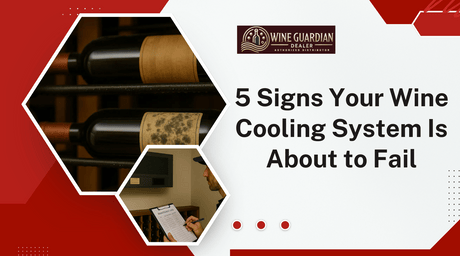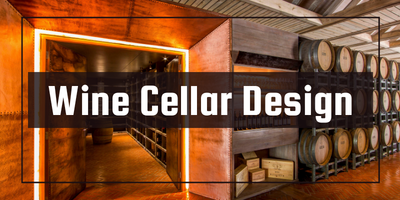
5 Signs Your Wine Cooling System Is About to Fail
Don’t wait for a costly surprise. Wine Guardian Dealer breaks down the top 5 signs your wine cooling system may be failing — and how to fix it before damage...
Jim Hopper
In Stock & Ready to Ship – Order Your Wine Cooling System Today!
Free Wine Cellar Expert Consultation | 📞 Call 1-800-260-1712
Start with a free expert consult—cooling system sizing, racking options, and no upsells.

Build your dream wine cellar—without costly mistakes or guesswork.
By Jim Hopper, Wine Cooling Expert
Wine is a delicate and evolving product that demands precise conditions to age properly. Without the right temperature and humidity, even the finest wines can suffer irreversible damage.
Improper cooling can cause:
A standard home HVAC system is not designed to maintain the critical balance of 55°F and 60–70% humidity that wine requires.
Dedicated wine cellar cooling systems are essential to create and sustain the perfect environment year-round.
Learn more about comprehensive wine cooling system planning to design a cellar that protects your collection for decades.

Choosing the right cooling system is one of the most important decisions in wine cellar design. The system you select impacts performance, aesthetics, installation flexibility, and long-term maintenance.
There are three main types to consider:
Ducted systems are often the top choice for luxury wine cellars. The cooling unit is installed remotely, and cool air is delivered through ductwork, keeping the cellar quiet and free from visible mechanical equipment.
Benefits of ducted systems:
Split systems separate the evaporator (inside the cellar) from the condenser (outside the cellar or in another room). They offer quiet operation and flexibility when ducting isn't practical.
Advantages of split systems:
Self-contained units house both the evaporator and condenser together, typically mounted through the wall. These systems are compact and affordable but require good ventilation planning.
Perfect for:

Selecting the right type of cooling system is only half the battle — sizing it correctly is crucial.
An undersized unit will struggle to maintain conditions, while an oversized unit can cause short-cycling, unnecessary wear, and humidity instability.
Proper sizing requires evaluating:
Get expert tips inside how to size a wine cellar cooling system.

Beyond choosing the right unit, your cellar’s construction will directly impact cooling efficiency and long-term system health.
Key factors include:
Well-planned designs avoid overload stress on the system, preserve energy efficiency, and extend system life.

Mistakes during design or installation can dramatically impact the lifespan and reliability of your cooling system.
Top pitfalls include:
Working with qualified wine cellar specialists helps avoid these costly setbacks.

Investing in a quality wine cellar cooling system means understanding the full cost picture.
Typical equipment ranges:
Installation, ductwork, electrical, and annual maintenance should also be factored into the total budget.

Your wine collection represents years of craftsmanship — and thousands of dollars of investment.
Choosing the right cooling system ensures each bottle matures as intended, protected by ideal conditions 365 days a year.
Review comprehensive wine cooling system planning for a step-by-step overview when designing or upgrading your cellar.

👋 Got questions? Need help picking the right wine cellar cooling system for your space?
Our experts at Wine Guardian Dealer are ready to help you every step of the way.
📞 Call us today at 1 (800) 260-1712 for your FREE Cooling Consultation!
📧 Or email us anytime at support@wineguardiandealer.com — we're happy to assist.
🛒 Browse our premium Wine Guardian collection designed for perfect wine protection.
Ideally, a wine cellar should be maintained at 55°F (13°C) to ensure the wine ages gracefully and retains its original character.
A wine cellar should maintain 60–70% relative humidity to keep corks moist and prevent oxidation.
Cooling system size depends on your cellar’s dimensions, insulation, glass exposure, and surrounding temperatures.
No. Regular air conditioners cannot maintain the required humidity and consistent low temperatures that wine demands.
🛒Shop our most-loved Wine Guardian cooling systems today.
🛠️Protect your wine with the most trusted systems on the market.
❤️Tested, reviewed, and loved by serious collectors like you.